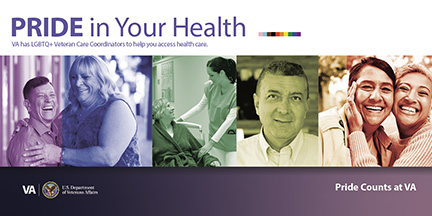“I have been thinking a lot about suicide,” said the Veteran, not making much eye contact. Unlike in past discussions, on this day he had a plan and access to lethal means. He had dealt with distress and thoughts of suicide most of his life—a life that included hiding that he was gay and coping with childhood sexual abuse and military sexual trauma.
I was sitting at a dining room chair in the tiny, senior apartment of a Vietnam Veteran in a rural town. He was seated across from me on a recliner where he also slept, walker in front. On the recliner was a soft fleece blanket he was worrying with his fingers. Touching the blanket was one of his important grounding strategies. The Veteran was in his late 70s and was dealing with many health problems. I had been visiting him about once a month for a year in my role as home-based primary care psychologist.
Stories like this Veteran’s may not be as rare as you think. We know that LGBTQ+ Veterans face many unique health challenges, including a higher risk for mental health issues and thoughts of suicide, than their non-LGBTQ+ counterparts.
This is even more true for Veterans in rural areas, which is why VA has been making inroads to increase access for Veterans in these areas—who are unable to leave their homes—by expanding clinical telehealth and use of the Veterans Crisis Line.
For LGBTQ+ Veterans, additional barriers may still exist, like uncertainties about how sexual orientation or gender identity will be perceived by VA or how it will affect care, especially when one may have had negative experiences in the past.
Abuse by authority figures who should have been support
During our first meeting, the Veteran told me he was gay. This identity was important in so many ways, both in terms of his experiences in the military, the ways he interacted with VA, his resilience and, unfortunately, his experiences with trauma. As a child he experienced sexual abuse at the hands of authority figures who should have been supports in his life. He experienced military sexual trauma before deploying. During our conversation that day, I wished I had something about suicide prevention and LGBTQ+ Veterans from VA to give him.
Now, through the LGBTQ+ Health Program, there is an LGBTQ+ Veteran Care Coordinator at every facility to help Veterans get the care they need. VA policies require that health care is delivered in an affirming and inclusive environment and that VA employees respect a Veteran’s identity. You can visit this link to contact the LGBTQ+ VCC at your nearest facility.
The first time I met this Vietnam Veteran, I put the Veterans Crisis Line number into his phone and set it as automatic dial #1. Since I had started visiting, he had not been hospitalized for thoughts of suicide and I wondered if that day might be the day. He said, “I didn’t know if I should tell you. I wondered if you would want to just lock me up, but I figured I trust you and you’re my psychologist, so I should tell you.”
After talking through how he was feeling and what his thoughts were, we agreed on a plan that did not involve hospitalization, and his thoughts of suicide dissipated over the next several weeks.
Suicide prevention tools
This story highlights the need for improving care and support for LGBTQ+ Veterans as a critical part of VA’s suicide prevention efforts. The VA Office of Suicide Prevention and the LGBTQ+ Health Program are working together to educate Veterans on LGBTQ+ suicide prevention efforts, including:
- Acknowledging the impact of discrimination experienced by LGBTQ+ Veterans, which can be associated with increased risk of suicide and barriers to seeking care.
- Continuing to improve services and provide education to increase inclusion of LGBTQ+ Veterans.
- Supporting LGBTQ+ Veterans and service members who call the Veterans Crisis Line, which is available 24/7.
- Having a suicide prevention coordinator at every VA Medical Center to connect you with your local LGBTQ+ Veteran Care Coordinator for additional support and resources.
A few months after this visit with the Veteran, I was moving to a new position within the LGBTQ+ Health Program. He told me he was sad but happy to hear that VA had an office for LGBTQ+ Health. He asked that I remember his story and share it whenever I had the opportunity.
I contacted my old team to bring him this new flyer for LGBTQ+ suicide prevention. LGBTQ+ Veterans have faced bias and discrimination which can affect health. Because of this we may have to work a little harder to earn your trust. Everyone plays a role in suicide prevention, and as a health care institution, we need to make sure LGBTQ+ Veterans feel welcome at VA.
If you’re a Veteran in crisis or concerned about one, contact the Veterans Crisis Line to receive 24/7 confidential support. You don’t have to be enrolled in VA benefits or health care to connect. To reach responders, Dial 988 then Press 1, chat online at Veterans Crisis Line, or text 838255.
Topics in this story
Link Disclaimer
This page includes links to other websites outside our control and jurisdiction. VA is not responsible for the privacy practices or the content of non-VA Web sites. We encourage you to review the privacy policy or terms and conditions of those sites to fully understand what information is collected and how it is used.
More Stories
Each year, I return to honor my old corpsman's memory and reflect on serving together.
Veteran was trained to collaborate with fellow Airmen. Having his buddy’s six was important, and still is.
It’s essential for Veterans to take action and prepare for tornados and spring storms while staying informed.







Why was my comment deleted. I have a right to speak my mind. It’s called the First Amendment. You are not an elected official, and you have no right to remove my comment. [Editor’s note: All comments are reviewed by VA employees before publishing. Sometimes that may appear as though a comment was deleted. The comment in question, should be online now.]
If you have been thinking a lot about suicide lately then you have a mental illness and that is how these things need to be treated. LGBTQ people do not have any more rights than me or anyone else. NONE, PERIOD. I do have to respect them, except them or acknowledge their fairytale world they live in. They need metal health help not expectance. Anyone that plays along with their make-believe world is harming them not helping them. These LGBTQ things see no problems dressing up like women and messing with children’s minds and being around children naked. They are pedophiles pain and simple. Shame on the VA for treating them like they are special and deserve special rights that only apply to them. You are sick people.
Hello my name is Barbara and I served in the army from 69 to 1973. i had my basic training at Fort McClellan in Alabama. I grew up in Portsmouth, Virginia. I knew nothing about being gay. I knew nothing about it. If you were found out you would be discharged. Men joined to avoid the draft. I quit high school to get out of a bad situation. But I joined during the 70’s. We had men break into our barracks and rape us and it still happens. Men have not changed. So be careful. I do not much about LGBTQ . Everyone has rights no matter who you are. I may not agree about what you identify as.Just remember to stay safe. When I was in women did not have as many rights as men. They may say that is not the truth but do not believe them. We have come a long way and made a path for you.
Stay safe,
Barbara
Thank you for sharing this and creating awareness of such an important issue for our veterans and all!
VA values a diverse and inclusive community. Negative and hateful comments undermine our commitment to fostering respectful dialogue. Let’s strive to uphold a culture of understanding and kindness in our interactions. Please see our social media policy. https://digital.va.gov/social-media/social-media-disclaimer/
Thank you for sharing this story. This is an excellent article with information to assist LGBTQ+ Veterans, and providers in finding resources for support.